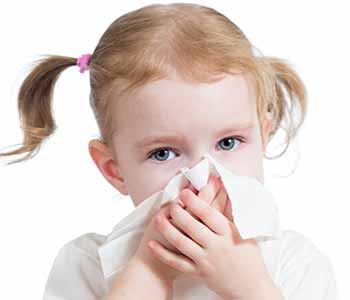A person can develop allergic symptoms when their immune system over reacts whenever the body comes in contact with an allergen. If the immune system is oversensitive it will react to allergens by producing antibodies to fight with them. Antibodies make the cells to release some chemicals including histamine.
Histamine cause the mucus membrane to become inflamed and produce excess mucus which in turn results in running nose, stuffiness, sneezing, itching of nostrils and eyes. This is termed as allergic rhinitis.
Allergic rhinitis may be seasonal or perennial. Seasonal allergies usually occur for a certain season where allergens like pollens are very high. Perennial allergies can occur year around in response to indoor allergens and pollution.
Allergies can affect anyone. People who have family history of atopy, dust allergy or asthma can increase the risk of allergic rhinitis.
Symptoms:
They manifest as
- Nasal congestion
- Sneezing
- Running nose
- Itchy, red and watery eyes
- Post nasal drip
- Itchy throat and nose
- Wheezing/shortness of breath
- Excess mucus production
- Cough
- Heaviness of head
- Generalised weakness
- Sleep disturbances
Causes:
Common allergic triggers include
- Pollens/Spores from plants, trees, grass.
- House dust mites
- Pet animals
- Molds
- Cold temperature
- Cigarette smoke
- Wood smoke/cooking fumes
- Pollutants in air
- Chemicals
- Hair Spray
- Perfumes, talcum powder

Homoeopathic treatment |
Conventional Treatment |
| Reduces paroxysms and intensity of sneezing | Reduces sneezing |
| Treats not only the symptoms but also removes the sensitivity to the allergens | Treats only the symptoms |
| Permanent cure | Temporary relief |
| Specific remedy for each person selected on the basis of both physical and mental generals | Common medicines prescribed to all persons |
| Natural/potentized medicines | Synthetic/concentrated medicines |
| Nil side effects | Chain of side effects |
Treatment Prognosis:
Reduces paroxysms and intensity of sneezing
Boosts immunity and reduces the sensitivity to allergens
Diet and Lifestyle Changes:
Foods to avoid
- Alcohol
- Caffeine
- Chocolate
- Milk
- Sugar
- Artificial Sweeteners
- Processed foods
Foods to include
- Citrus fruits especially pineapple
- Proteins-Pulses, Nuts, Meat
- Probiotics- Curd
- Honey
- Ginger
- Garlic
- Cinnamon
- Pepper
- Water
The best way to prevent allergic rhinitis is to avoid the allergen that causes it. But this is not always possible. Allergens such as dust mites aren’t always easy to spot and can breed in even the cleanest house.
- Reduce the usage of carpet/ Avoid carpets at home
- Clean curtains, cushions, toys, furniture often either by washing or vacuuming them
- Dry pillows, beds in direct sunlight
- Use damp cloth to wipe dust surfaces
- Keep pets outside as much as possible
- Wash pets regularly and groom them outside
- Use masks to cover nose
- Use wraparound sun glasses
- Avoid grassy areas and garden
- Keep home dry and well ventilated
- Use exhaust fan while cooking
- Keep windows open while cooking
- Avoid drying clothes indoor.


